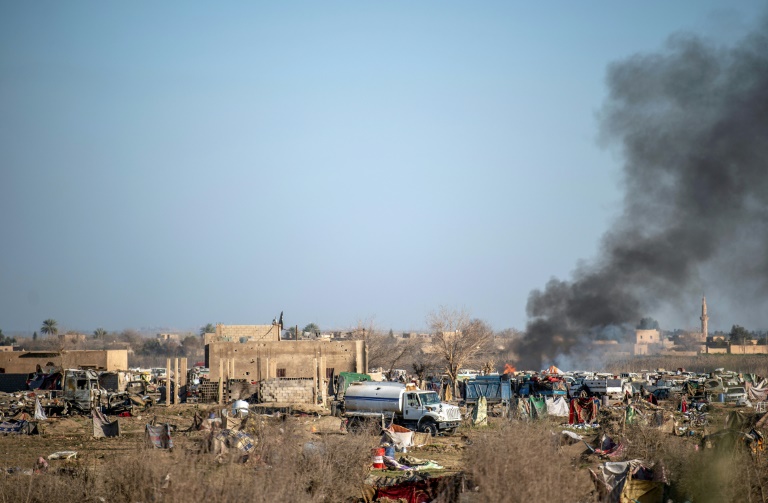
Little remains of the IS "caliphate" that once spread across a territory the size of Britain, imposing a brutal form of Islamic law on millions of people. (Photo: AFP)
Their last Syrian bastion is levelled and burned, they are using rifles to battle warplanes and tanks, but the hardline jihadists holding out in Baghouz are still putting up a fight.
Defeat is guaranteed, but a few diehard Islamic State fighters defending the last tiny, smouldering vestige of their once-sprawling "caliphate" are refusing to surrender.
The Syrian Democratic Forces, the Kurdish-led outfit which has spearheaded the fight with backing from the US-led coalition against IS, say their assault is in its final hours.
IS fighters are now cornered on a palm-lined bend of the Euphrates near Syria's border with Iraq, but they are still on the offensive.
"They attacked on two axes, from the Euphrates river, and from the hill," an SDF commander who gave his name as Sheikh Al-Jabal says from the roof of a nearby villa used as a military position.
He points to the banks of the river behind the IS encampment, about a kilometre (half a mile) away, but the view is obscured by the thick black smoke billowing out of the ruins of Baghouz.
A wasteland strewn with the charred carcasses of vans, cars and water tankers lies beyond the SDF's positions, marking the edge of the handful of acres ruled by IS.
Nobody seems to know how many fighters are left inside the shrinking pocket.
Despite thousands of people surrendering in recent weeks, the tiny hamlet of Baghouz has released a seemingly never-ending flow of civilians and fighters.
On Wednesday, after the SDF announced that another 3,000 IS members had surrendered, another contingent launched at least two counter-attacks.
"They are using tunnels, they have experienced snipers," Sheikh Al-Jabal says, a walkie-talkie in one hand and another clipped to his belt.
Behind him, a huge black cloud caused by air strikes on IS ammunition depots darkens the sky and engulfs the little riverside village.
The fires still rage hours after the strikes, fanned by the dusty desert wind.
- 'They just keep coming' -
"IS had conquered vast territories in Syria and Iraq," the commander explains, referring to the jihadist's lightning cross-border assault in the summer of 2014.
"They seized ammunition and weapons from the army and all of this ended up being transferred to their last bastion," he adds. "To this moment, they are refusing to let go of their dream of a state."
Baghouz is the last of a string of farming villages dotting the banks of the river. All lie in ruins, their streets made unusable by huge craters and unexploded ordnance.
"Chickens for sale", "Ice factory": a few wall inscriptions bear witness to daily life in what was once the very heart of the jihadists' proto-state.
The past few days have followed a set pattern: the SDF on the ground and its coalition allies in the sky unleash their superior firepower on the jihadist stronghold.
At dawn, guns go silent to allow for the exit of the latest batch of jihadist families, pummelled into submission by the night's deluge of fire.
"We're surprised every time. We say there aren't many jihadists left... and they just keep coming out of their holes," says an SDF fighter returning from the front.
At another SDF position, fighter Massino Kobane's eyes are red with exhaustion after a night of fighting.
"I'm determined not go home before IS has been eradicated," says the 21-year-old, who hasn't seen his family in three years.
The young Kurd took part in some of the largest battles against the jihadists, helping seize cities such as Kobane, Manbij and their main Syrian stronghold Raqa when IS was still a major force.
The battle to crush the last remnant of the caliphate in the Euphrates Valley was launched six months ago. But while the outcome was never in doubt, the fighting has dragged on.
Kobane hopes he will soon be able to return to his loved ones and find a job in his native city of Kobane.
"Our comrades are a bit tired after all these battles," he says.


